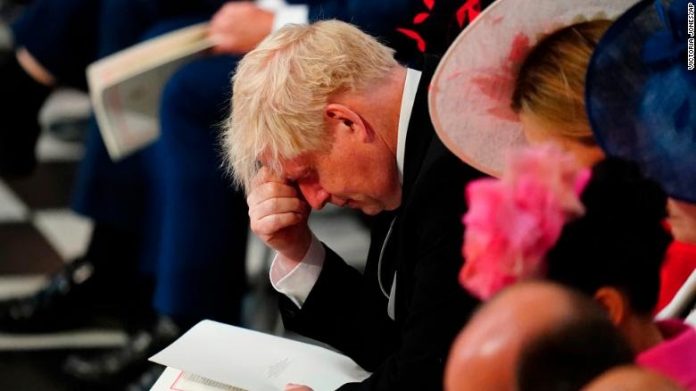Boris Johnson ends the week with reason to be cheerful. On Monday, he survived the biggest challenge to his leadership since becoming Prime Minister, after his Conservative MPs backed him in a confidence vote to remain party leader by 211 to 148.
That victory does, however, come with some major caveats.
Johnson’s government is currently thought to have somewhere between 170-180 MPs on its payroll. As the vote was private, that means as a best-case scenario, Johnson was only able to secure a handful of backbench votes. In a worst-case scenario, people on the payroll voted against him the second they were given the protection of anonymity.
While Johnson and his allies have since claimed the victory was convincing and a decisive result that hands the PM a refreshed mandate, the reality is 41% of his own MPs do not want him in power. That number is worse than the result of a confidence vote in Johnson’s predecessor, Theresa May, in 2018 and is likely to rise in the coming months.
For now, though, Johnson’s job is safe. Conservative Party rules protect him from another confidence vote for 12 months. There is speculation that the party might try and rewrite those rules, but given the private nature of the Conservatives, it’s hard to get a real sense of how likely this is.
So, what happens next?
Johnson is announcing a flurry of policy ideas designed to cheer up his backbenchers and voters. More houses, more doctors, more police, crackdowns on illegal immigration to name a few.
Meanwhile, those who most want to see his downfall are not sitting on their hands. Publicly, MPs say that the result of the confidence vote means they owe Johnson their loyalty — for now. He deserves the time to turn things around, they say.
However, multiple sources confirmed to CNN that those with an eye on the top job are already building their power bases and getting ready to launch leadership bids, should the time come.
Dinners with donors who would fund individual campaigns have already taken place, organized by MPs who have already picked their choice for leader. Influential MPs have been courted to test the water.
“The phone calls tend to start with 15 minutes of insisting that Boris has their full support and that they don’t think a leadership contest will happen. Then they outline their vision of how they would improve things. It’s discreet, but it’s happening,” a senior Conservative told CNN.
The hopefuls acting most openly are unsurprisingly long-term critics of Johnson.
“Most of the activity seems to be around Jeremy Hunt and other former Remainers,” says one veteran Conservative and former cabinet minister, referring to those who wanted the United Kingdom to remain in the European Union. “That makes sense as they never wanted Boris in the first place and have the least to lose.”
Hunt, who has held three cabinet posts, most notably health, is without question the highest-profile contender on the moderate, ex-Remain side of the party. However, he comes with baggage and sources from the opposition Labour Party have told CNN they are already writing attack lines.
Jeremy Hunt is without question the highest-profile contender on the moderate, ex-Remain side of the Conservative Party.
A senior Conservative said that their fellow MPs are aware of this. “It can’t be Jeremy. Labour can say he was running healthcare for six years and failed to prepare for a pandemic. They can say when he was culture secretary he chummed up to the Murdochs during the phone hacking scandal. He will get crushed,” the source said.
Other potential candidates for this side of the party include Tom Tugendhat, a former soldier who chairs the Foreign Affairs Select Committee, and the current Education Secretary, Nadhim Zahawi.
Tugendhat has impressed colleagues with his oratory and seriousness, most notably when he spoke about the fall of Afghanistan, a country where he’d served while in the army.
Despite voting to leave the EU in 2016, Zahawi is widely admired among the moderates in the party. Crucially, as one Conservative source put it, “he’s not been in government long enough to have any obvious defects and, despite supporting Boris even after the confidence vote, is not too tainted by association.”
Obviously running a stealth leadership campaign is harder if you are a sitting cabinet minister. How do you square defending the prime minister after the confidence vote while courting MPs to test the water?
That is the problem facing those considered to be the Leave candidates.
Liz Truss, the foreign secretary, voted Remain in 2016, but has since become one of the loudest Euroskeptic voices in the government, particularly on Northern Ireland. She has a formidable and dedicated team around her — some of whom previously worked in Number 10 — which has been producing slick videos and photos of her looking thoroughly statesmanlike. Which might come in handy if she were to run for leader, a cynic might say.
Foreign Secretary Liz Truss voted Remain in 2016, but has since become one of the loudest Euroskeptic voices in the government, particularly on Northern Ireland.
A source working in the Foreign Office told CNN that since Monday, Truss “has been in endless meetings with MPs,” adding that while the meetings are officially about Northern Ireland “it’s been insinuated that she’s seeing what her support base is, should the time come.”
Truss’s office denies that any covert leadership bid is coming. She said before the confidence vote that she backed Johnson “100%” and encouraged colleagues to do the same. After the vote, she urged MPs that it was time to move on “get behind the PM”.
Truss’s most obvious rival is current Home Secretary Priti Patel. One of the Conservative sources said that Patel’s stealth campaign “has been busy, organized and running for about a year.”
Patel is very popular among the party’s grassroots and more conservative wing. She is a longstanding Euroskeptic who has years of hard talk on immigration, crime and economics under her belt. She famously used to support bringing back the death penalty, although she has since distanced herself from this.
Both cabinet ministers publicly support the prime minister and officials say that their focus is on delivering Johnson’s agenda, nothing else.
However, a government minister told CNN that some cabinet ministers are “using their office to raise their profile and engage with MPs.”
While inviting influential MPs into your grand office of state is nothing new, the minister says that the tone in Westminster “has changed since Monday. Everyone expects that there will be a vacancy at some point in the near future.”
The next major hurdle for Johnson to clear is the two by-elections taking place on June 23. If he loses both, which is not impossible, his critics will move again. The party might try to rewrite rules so he faces another leadership vote.
If the party doesn’t rewrite the rules, he has an uphill struggle to turn around both his own popularity and the popularity of his party before the next scheduled election in 2024.
It’s an unenviable task, given the UK is experiencing a cost-of-living crisis and the Conservatives have been in power for 12 years. And under normal circumstances, you’d be forgiven for thinking that Johnson is safe as no one in their right mind wants the job.
But that’s how bad things are. Despite how grim the next few years look for the UK, ambitious politicians are willing to throw their hats in the ring at what might be the worst possible moment and risk their whole career. Because if they don’t, it’s anyone’s guess how far Johnson might pull his party down with him.
Culled from CNN



